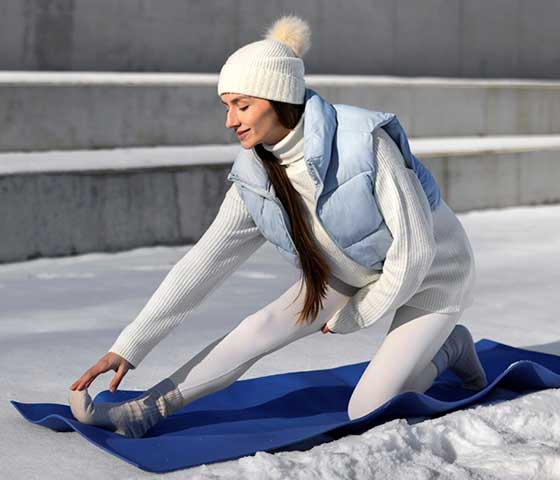Winter presents unique challenges for those who in treatment or those considering starting a physiotherapy program. Conditions such as snow, slippery sidewalks and freezing temperatures discourage us from moving our bodies.

However, physiotherapy requires regularity and follow-up to obtain the best results. On the other hand, interrupting treatment prolongs recovery even further, which in addition to delaying it, can intensify pain and injuries. At Revolve Physiotherapy, our our team are ready to provide expert treatment to keep you fit in the winter and ready for outdoor activities in summer.
We recommend for our patients to dress warmly and wear appropriate shoes with good traction to prevent slips and falls. Also, it’s important for patients to continue their exercises and stretches as prescribed by their physiotherapist, even in the cold weather. They can also do some modifications to the exercises if needed, such as performing them indoors or in a heated area.

In addition, keep the joints warm during the winter months, as cold temperatures can cause stiff and sore joints. Patients may benefit from using heating pads or taking warm baths before their physiotherapy sessions.
Here are some factors to consider:
Cold Temperatures: Cold weather can affect joint mobility and increase stiffness. Individuals with conditions like arthritis may experience more discomfort during the winter months. It’s important to dress warmly and use heat therapy before engaging in physiotherapy exercises.
Slippery Surfaces: Snow and ice can create slippery conditions, increasing the risk of falls. Patients should be cautious when navigating outdoor spaces and consider modifying their exercises if necessary.
Seasonal Affective Disorder (SAD): Some people may experience a decline in mood and motivation during the winter months. This can impact their commitment to physiotherapy exercises. Practitioners should be aware of these potential challenges and work with patients to find strategies to stay motivated.
Home Exercise Programs: For patients who find it challenging to go outside during winter, we may recommend indoor exercises. These can include stretches, strength training, and balance exercises that can be done at home with minimal equipme
Also important to remember:
Dehydration: Cold weather can sometimes lead to decreased awareness of thirst. Staying hydrated is essential for overall health and can also support the body’s ability to heal and recover from physiotherapy exercises.
Nutrition: Proper nutrition is crucial for recovery. In the winter, individuals may be more inclined to consume comfort foods that may not support their physiotherapy goals. Educating patients on the importance of a balanced diet is essential.
Regular Check-ins: Patients should maintain regular communication with their physiotherapists, providing updates on any challenges or changes in their condition. This allows for adjustments to be made to the treatment plan as needed.
Injury Prevention: Winter sports and activities can pose an increased risk of injury. Our team may provide advice on injury prevention strategies and techniques to reduce the risk of accidents.
In summary, winter can impact the practice of physiotherapy, but with careful consideration and adaptation, individuals can continue to benefit from their rehabilitation programs. It’s important for both patients and healthcare providers to work together to address the specific challenges that the winter season may present.
Remember, these suggestions are general in nature and not a substitute for professional medical advice. Always consult with a qualified healthcare provider for accurate diagnosis and appropriate treatment based on your specific situation.

Finally, it is important to note that physiotherapy is still an effective way to manage pain and improve mobility during the winter months. It is important to keep up with the prescribed exercises and physiotherapy sessions to continue to make progress towards recovery.
Winter and Physiotherapy in Milton. We will be happy talking to you, call us now 905 864.8181 and talk to a Specialist Physiotherapist.
